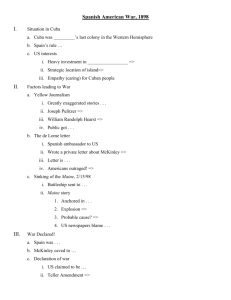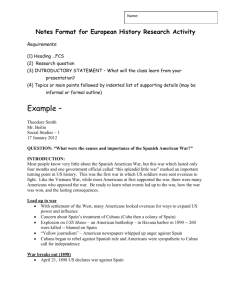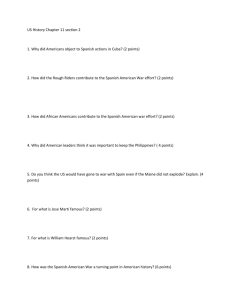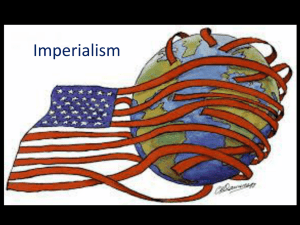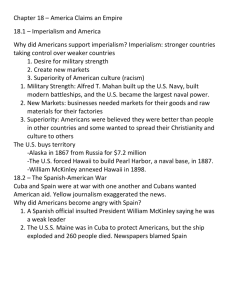APUS History Notes Chapter 29: “The Path of Empire” ~ 1890 – 1899
advertisement
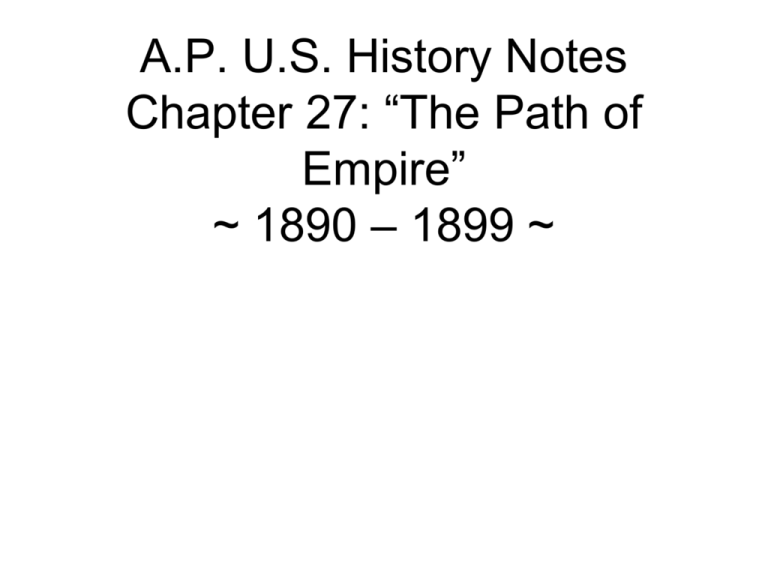
A.P. U.S. History Notes Chapter 27: “The Path of Empire” ~ 1890 – 1899 ~ Imperialist Stirrings • From the end of the Civil War to the 1880s, the United States was very isolationist, but in the 1890s, the U.S. began looking overseas. • With a new sense of power generated by an increase of population, wealth and industrial power, the U.S. looked to imperialism. • People were interpreting Darwin’s theory of “survival of the fittest” to mean that the United States was the fittest and needed to take over other nations to improve them. • Such events already were happening, as Europeans carved up Africa and China at this time. Imperialist Stirrings • Captain Alfred Thayer Mahan’s 1890 book, The Influence of Sea Power Upon History, 1660-1783, argued that every successful nation had a great navy, starting a naval race among the great powers. • In diplomatic affairs, America and Germany almost went to war over the Samoan Islands (over which could build a naval base there), while Italy and America almost fought due to the lynching of 11 Italians in New Orleans, and the U.S. and Chile almost went to war after the deaths of two American sailors at Valparaiso in 1892. Monroe’s Doctrine and the Venezuelan Squall • British Guiana and Venezuela had been disputing their border for many years, but when gold was discovered, the situation worsened. • Thus, the U.S., under President Grover Cleveland, sent a note written by Secretary of State Richard Olney to Britain informing them that the British actions were trespassing the Monroe Doctrine and that the U.S. controlled things in the Americas. • The British replied four months later saying that the Monroe Doctrine didn’t exist. Monroe’s Doctrine and the Venezuelan Squall • A deal was struck and the result was that the Monroe Doctrine was strengthened, the Latin American nations appreciated the U.S. effort to protect them, and Britain sought better relations with the U.S. afterwards, since it had many enemies in Europe. • America’s drive towards Imperialism was based on the need for new oversea markets, desire to expand our military strength and our own AngloSaxon superiority. Spurning the Hawaiian Pear • From the 1820s, when the first U.S. missionaries came, the United States had always liked the Hawaiian Islands. • Treaties signed in 1875 and 1887 guaranteed commercial trade and U.S. rights to priceless Pearl Harbor, while Hawaiian sugar was very profitable, but in 1890, the McKinley Tariff raised the prices on this sugar, raising its price. • Americans felt that the best way to offset this was to annex Hawaii—a move opposed by its Queen Liliuokalani—but in 1893, desperate Americans revolted. Spurning the Hawaiian Pear • They succeeded, and Hawaii seemed ready for annexation, but Grover Cleveland became president again, investigated the coup, found it to be wrong, that Hawaiians did not ant to be part or the U.S. and delayed the annexation of Hawaii until he basically left office. • Cleveland was bombarded for stopping “Manifest Destiny,” but his actions proved to be honorable for him and America. Hawaii Cubans Rise in Revolt • In 1895, Cuba revolted against Spain, citing years of misrule, and the Cubans torched their sugar cane fields in hopes that such destruction would either make Spain leave or America interfere (the American tariff of 1894 had raised prices on it anyway). And much of those plantations were owned by Americans • Spain used brutal tactics to put down the Cuban revolt. (Concentration Camps) • The American public clamored for action, but Cleveland would do nothing. The Mystery of the Maine Explosion • The yellow presses competed against each other to come up with more sensational stories, and Hearst even sent artist Frederick Remington to draw pictures of often-fictional atrocities • Example, he drew Spanish officials brutally stripping and searching an American woman, when in reality, Spanish women, not men, did such acts. • Then, suddenly, on February 9, 1898, a letter written by Spanish minister to Washington, Dupuy de Lôme, which totally ridiculed president McKinley was published by Hearst. The Mystery of the Maine Explosion • The Battleship Maine was officially sent to Cuba to protect and evacuate American Citizens • On February 15th of that year, the U.S. battleship Maine mysteriously exploded in Havana Harbor, killing 260 officers and men. • Papers Printed “IT WAS A SPANISH MINE!” and “TO HELL WITH SPAIN! REMEMBER THE MAINE!” America was war-mad, and Spain was about to be crushed. • Actually, what really happened was that an accidental explosion had basically blown up the ship—a similar conclusion to what Spanish investigators suggested—but America ignored them. McKinley Unleashes the Dogs of War • The American public wanted war, but McKinley privately didn’t like war or the violence, since he had been a Civil War major; in addition, Mark Hanna and Wall Street didn’t want war because it would upset business. • However, on April 11, 1898, the President sent his war message to Congress anyway, since: war with Spain seemed inevitable based on the publics outcry, • Congress also adopted the Teller Amendment, which proclaimed that when the U.S. had overthrown Spanish misrule, it would give the Cubans their freedom. – Teller was a Senator from Colorado. Dewey’s May Day Victory at Manila • • • • On paper, at least, the Spanish had the advantage over the U.S., since it had more troops and a supposedly better army, as well as younger (less senile) generals. Navy Secretary John D. Long and his assistant secretary, Theodore Roosevelt had modernized the U.S. navy, making it sleek and sharp. On February 25, 1898, Roosevelt cabled Commodore George Dewey, commanding the American Asiatic Squadron at Hong Kong, and told him to take over the Philippines. A controversial move since the conflict with Spain was centered around CUBA Dewey did so brilliantly, completely taking over the islands from the Spanish. Unexpected Imperialistic Plums • The Philippines were considered fair game because their were Spanish colonies and the U.S. was at war with Spain. • They had great potential for opening new markets for America in China and Southern Asia • Dewey had naval control, but he could not storm the islands and its fortresses, so he had to wait for reinforcements, but meanwhile, other nations were moving their ships into Manila Harbor to protect their men. • The German navy defied American blockade regulations, and Dewey threatened the navy commander with war, but luckily, this episode blew over, due in part to the British assistance of America. Unexpected Imperialistic Plums • Finally, on August 13, 1898, American troops arrived and captured Manila, collaborating with Filipino insurgents, led by Emilio Aguinaldo, to overthrow the Spanish rulers. • After a series of events NOT ASSOCIATED WITH THE SPANISH _AMERICAN WAR, On July 7, 1898, the U.S. annexed Hawaii (so that it could use the islands to support Dewey, supposedly), and Hawaii received full territorial status in 1900. The Confused Invasion of Cuba • • • • • The Spanish sent warships to Cuba, panicking Americans on the Eastern seaboard, and the fleet, commanded by Admiral Cervera, found refuge in Santiago harbor, Cuba. Then, it was promptly blockaded by a better American force. American ground troops, led by fat General William R. Shafter, were illprepared for combat in the tropical environment (i.e. they had woolen long underwear). The “Rough Riders,” a regiment of volunteers led by Theodore Roosevelt and Colonel Leonard Wood, rushed to Cuba and battled at El Caney San Juan Hill. TR had lots of fun. Curtains for Spain in America • Admiral Cervera was finally ordered to fight the American fleet, and his fleet was destroyed. • On land, the American army, commanded by General Nelson A. Miles, met little resistance as they took over Puerto Rico. • Soon afterwards, on August 12, 1898, Spain signed an armistice. • Note that if the Spaniards had held out for a few more months, they might have won, for the American army was plagued with dysentery, typhoid, and yellow fever. • Finally, TR wrote a “round-robin” letter which demanded that the U.S. government take the troops out before they all died. McKinley Heeds Duty, Destiny, and Dollars • In negotiations in Paris, America got Guam and Puerto Rico and freed Cuba, but the Philippines were a tough problem, since America couldn’t honorably give it back to Spain after decades of misrule, but the U.S. couldn’t just take it like an imperialistic nation. • Finally, McKinley decided to keep the Philippines, even though they had been taken one day after the end of the war, but he did so because of popular public opinion, not to mention the urging of his wife, an invalid. • The U.S. paid $20 million for the islands. America’s Course (Curse?) of Empire • After the Spanish-American war ended the AntiImperialist League sprang into being, firmly opposed to this new imperialism of America, and its members included Mark Twain, William James, Samuel Gompers, and Andrew Carnegie. • Even the Filipinos wanted freedom, and denying that to them was un-American. America’s Course (Curse?) of Empire • However, expansionists cried that the Philippines could become another Hong Kong. • British writer Rudyard Kipling wrote about “The White Man’s Burden,” urging America to keep the Philippines and “civilize them.” • In the Senate, the treaty almost was not passed, but finally, William Jennings Bryan argued for its passage, saying that the sooner the treaty was passed, the sooner the U.S. could get rid of the Philippines; the treaty passed by ONE VOTE. Perplexities in Puerto Rico and Cuba • Puerto Ricans were granted full U.S. citizenship in 1917. • U.S. help also transformed Puerto Rico and worked wonders in sanitation, transportation, beauty, and education. • In the Insular Cases, the Supreme Court barely ruled that the Constitution did not have full authority on how to deal with the islands (Cuba and Puerto Rico), essentially letting Congress do whatever it wanted with them. Perplexities in Puerto Rico and Cuba • America could not improve Cuba that much, other than getting rid of yellow fever with the help of General Leonard Wood and Dr. Walter Reed. • In 1902, the U.S. did indeed walk away from Cuba, but it also encouraged Cuba to write and pass the Platt Amendment, which became their constitution. • This said that the U.S. could intervene and restore order in case of anarchy, that the U.S. could trade freely with Cuba, and that the U.S. could get two bays for naval bases, notably Guantanamo Bay. New Horizons in Two Hemispheres • The Spanish-American War lasted only 113 days and affirmed America’s presence as a world power. • However, America’s actions after the war made its German rival jealous and its Latin American neighbors suspicious. • Finally, one of the happiest results of the war was the closing of the bloody chasm between the U.S. North and South, which had been formed in the Civil War. • General Joseph Wheeler was given a command in Cuba. American Interest in Cuba • U.S. long interested in Cuba; wants to buy Cuba from Spain • During 1868–1878 war for independence, American sympathies with Cuba • 1886 abolition of slavery leads to U.S. investment in sugar cane The Second War for Independence • José Martí—poet, journalist—launches second revolution in 1895 • Guerrilla campaign destroys American-owned sugar mills, plantations • U.S. public opinion split: - business wants to support Spain - others favor Cuban cause Foreign Influence in China U.S. Interest in China • U.S. sees China as vast potential market, investment opportunity • France, Britain, Japan, Russia have settlements, spheres of influence • U.S. Secretary of State John Hay issues Open Door notes to promote free trade in China • Notes ask imperialist nations to share trading rights with U.S. • As the U.S. flexes financial and military muscle other powers reluctantly agree Boxer Rebellion • Europeans dominate most large Chinese cities • Chinese form secret societies, (Like The Fists of Righteous Harmony) including called Boxers (for their martial arts skills), to expel foreigners • Boxers kill hundreds of foreigners, Chinese converts to Christianity • U.S., Britain, France, Germany, Japan put down Boxer Rebellion • Hay issues new Open Door notes saying U. S. will keep trade open • Open Door policy reflects beliefs about U.S. economy: - growth depends on exports - U.S. has right to keep markets open - closing of area threatens U.S. survival Theodore Roosevelt • Highly energetic and egotistical, Roosevelt is a Progressive powerhouse, that gained political support for being able to compromise in politics • He resigned as Secretary of the Navy during the Spanish American War so he could join the Rough Riders • As governor of New York, he took great efforts to clean up the political machine with his Progressive party positions. • So annoyed were the New York Party Bosses that they successfully played to his ego and got him the Republican VP-nomination in 1900 mainly to get him out of New York • A staunch Imperialist, he helped win the election because it was a key issue of the campaign. McKinley Assassinated • President McKinley is shot in the stomach by a Polish Anarchist on a visit to Buffalo NY and dies 8 days later • Roosevelt at 42 becomes the youngest President ever at that point. • As a president of the new century he has largescale ambitions for the U.S. Teddy Roosevelt and the World Panama Canal • U.S. wants canal to cut travel time of commercial, military ships • U.S. buys French company’s route through Panama • Negotiates with Colombia to build Panama Canal; talks break down • Agents helps organize Panamanian rebellion - U.S. gives military aid by sending naval forces to block Columbian troops from crushing the revolt • U.S., Panama sign treaty; U.S. pays $10 million for Canal Zone Constructing the Canal • Construction of canal is one of world’s greatest engineering feats - fight diseases, geographic obstacles - at height, 43,400 workers employed The Roosevelt Corollary • Roosevelt fears European intervention if Latin America defaults • Reminds Europeans of Monroe Doctrine, demands they stay out • Roosevelt Corollary—U. S. to use force to protect economic interests • Early 1900s, U.S. exercises police power on several occasions • Dollar diplomacy—U.S. guarantees foreign loans by U.S. business


